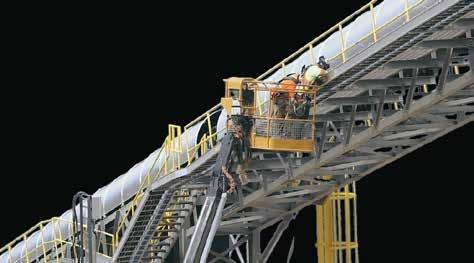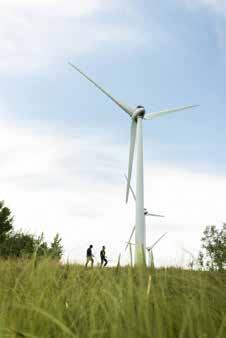

BIOFUEL CONSUMPTION SURGES FOLLOWING IMPLEMENTATION OF CANADA'S CLEAN FUEL REGULATIONS
POWERING THE NET-ZERO FUTURE: HOW BC NET ZERO INNOVATION NETWORK (BCNZIN) IS DRIVING CLEAN TECH INNOVATION IN BRITISH COLUMBIA





BIOFUEL CONSUMPTION SURGES FOLLOWING IMPLEMENTATION OF CANADA'S CLEAN FUEL REGULATIONS
POWERING THE NET-ZERO FUTURE: HOW BC NET ZERO INNOVATION NETWORK (BCNZIN) IS DRIVING CLEAN TECH INNOVATION IN BRITISH COLUMBIA


Like biogas captured from cow manure to create Renewable Natural Gas1 (RNG). It’s a low-carbon2 energy that can help reduce overall greenhouse gas emissions, with more RNG projects underway.
Customers can sign up for the voluntary RNG program to designate five, 10, 25, 50 or 100 per cent of the gas they use as RNG.
Find out more about RNG at fortisbc.com/rngbuild.
1Renewable Natural Gas (also called RNG or biomethane) is produced in a different manner than conventional natural gas. It is derived from biogas, which is produced from decomposing organic waste from landfills, agricultural waste and wastewater from treatment facilities. The biogas is captured and cleaned to create RNG. When RNG is added to North America’s natural gas system, it mixes with conventional natural gas. This means we’re unable to direct RNG to a specific customer. But the more RNG is added to the gas system, the less conventional natural gas is needed, thereby reducing the use of fossil fuels and overall greenhouse gas emissions. 2When compared to the lifecycle carbon intensity of conventional natural gas. The burner tip emission factor of FortisBC’s current Renewable Natural Gas (also called RNG or biomethane) portfolio is 0.27 grams of carbon dioxide equivalent per megajoule of energy (gCO2e/MJ). FortisBC’s current RNG portfolio lifecycle emissions for stationary combustion are -22 gCO2e/MJ. This is below B.C.’s low carbon threshold for lifecycle carbon intensity of 30.8 gCO2e/MJ as set out in the 2024 Greenhouse Gas Reduction Regulation amendments .

The BCSEA Board of Directors is an all-volunteer working board, and its members work hard to fulfill the mission of our organization. We thank all board members, past and present, for their dedication to the BC Sustainable Energy Association and our vision of a sustainable energy future in the province.














program in the spring of 2020 — an offering that is a part of our program to this day. Despite the challenges presented by the pandemic, Cool It! continued to grow — both in our number of municipal partnerships and the impact derived from student participation in our curriculum.
Fast forward to 2025 and Cool It! is forecasted to be delivered in over 400 classrooms throughout B.C. during the 2024/25 school year. Our high school program now has more than 100 participating classes annually and is supported by more than 20 municipalities. To sustainably grow a program such as ours by more than 200 per cent in five years is a tremendous effort, and the result of a lot of hard work by the whole team at Cool It! and the ongoing support of the BCSEA Board of Directors. It is also the result of several key learnings made during this time.
If our program had a mantra, it would be “always be flexible”. We have intentionally designed our approach, materials, and facilitator training to maximize our ability to adapt to the specific needs of teachers and their students. In doing so, we can mold our core program around the unique requirements of a classroom and say yes to as many opportunities as possible throughout a school year. Over the past five years, we have presented workshops at school fairs, incorporated our materials into class field trips, and modified our curriculum for use in specific class contexts, such as math or music.
As Program Director, I place a deep level of trust in my team of classroom facilitators and actively encourage them to centre their own experience of climate change and environmental action into their delivery approach. The sharing of our collective experience of climate change builds empathetic bonds between our facilitators and the students they work with. It provides for an open, safe space for students to ask questions and share their concerns about the impacts of climate change. Our facilitators also act as role models, sharing the climate actions they have taken.
For youth, particularly younger students, some of the most tangible climate action takes place in their local communities: at school, in their neighbourhood, and with their local government. We intentionally place a local focus on our curriculum to ground it to local places and the natural spaces that they interact with. We also seek to connect them with tangible actions they can take with organizations and initiatives that are having a real impact right where they live.
As a team we look forward to many more years of growing our program across B.C. and working with many more inspiring teachers and students. If you are a teacher or know a teacher who would be interest in working with us, please reach out to cool-it@bcsea.org.

The Vancouver chapter of BCSEA is keenly involved in public engagement and advocating for a more sustainable energy landscape for the province. One of the key visions within the Vancouver chapter is to engage with the public and present educational tools and awareness of how the energy industry impacts their daily lives, and vice-versa.
This year, the Vancouver chapter is excited to announce several new Steering Committee members, eager to connect with the sector and the public. Check out our
website https://bcsea.org/vancouver-chapter/ to see who these wonderful people are.
This year the BCSEA and Vancouver chapter will be engaging in events in 2025, which include:
• Chilliwack Rotary Climate Fair – Saturday April 12, 2025
• WiSE (Women in Sustainable Energy) – October 17, 2005
• Everything Electric – September 6-7, 2025
• Energy Connections – October 23, 2025


One of the main responsibilities of the Vancouver chapter is amplifying the current events of our changing energy landscape and aiding in the transparent transfer of information regarding sustainable energy to the public.
There is consistently a high level of enthusiasm from participants that want to engage within our chapter. This brings optimism for B.C.’s energy landscape, and a positive outlook for the growth of sustainable energy in the future.
In the coming year, the Vancouver chapter hopes to host smaller-scale public forums to strengthen our networks and bring the sustainable discussion to all in an accessible manner. The Vancouver chapter is composed of dedicated and industrious members, who are making a difference and enjoying the opportunity to work with and represent the BCSEA in its over 20 years, and who look forward to many more to come.
Find more information about our Vancouver chapter at bcsea. org/vancouver-chapter. If you are interested in becoming a member and volunteering on our Steering Committee or at events, contact us at vancouver@bcsea.org.
of active transportation. We have also participated in a number of home shows in which we tried to introduce attendees to the benefits of energy efficiency, low energy appliances, solar panels and more.
But we have recently found that our presence at these shows is not as useful as more participants become more knowledgeable about the benefits of sustainability in general and are more interested in specific details of, for example, how to find a competent heat pump installer which is something that we are not well placed to do. We would however like to figure out how to continue sustainability focused educational speaking events.
On the advocacy side, our chapter was strongly involved in the mid to late 2010s in advocating local municipalities to develop climate action plans to try to make their municipalities 100 per cent renewable by 2050. We engaged with the District of Saanich and, along with some other organizations, were successful in getting them to create such a plan. We also similarly engaged with the City of Victoria and several smaller municipalities such as Metchosin on the same issue.
Since most municipalities now have such plans, this is no longer a focus of ours, but we are looking for new advocacy ideas.
Our chapter has struggled some in recent years, due to the pandemic and adapting to an ever-changing outlook in the world of sustainability and the climate crisis. But in the last year we have gained some new
volunteers with new ideas that we are excited about. We are currently testing and developing some of these ideas, but we hope to be able to share more about this soon. And of course, we are still looking for new ideas and energy. Maybe you are someone who has one of those ideas or just wants to meet up with people
in the Victoria area who are trying to make a difference in moving toward a sustainable British Columbia, Canada, and world. If so, please email us at victoria@bcsea.org and we’d be happy to tell you more about what we are doing and how you could be involved.





instrumentation, and communications installations and maintenance services with a focus on safety, quality, and expert supervision.


Another month is behind us here as far as winter is concerned and our chapter is looking forward to longer days and spring on the horizon. We have been actively meeting once a month and more frequently as required. Please be in touch with the Prince George Chapter at princegeorge@bcsea.org at with any ideas or support you would like to offer.
Our chapter is actively pursuing a grant with Prince George Community Development to add to funding our chapter kick-off and the launch of the Cool-It!, Energy Connections, and WiSE conferences in the Great White

North! Wish us luck!! A shout out to the Lheidli T’enneh First Nation and the Cedars Christian School for providing support letters for this opportunity!
And finally, we are excited about BCSEA's second edition of our magazine and we'll be delivering copies to potential Prince George members! Our next edition will be out for September and if you're looking to advertise please reach out to bcsea.admin@bcsea.org. If you haven't subscribed to BCSEA to receive our newsletters and communications you can do so here https://bcsea.org/subscribe-to-newsletter/.

With half a decade of proven expertise, Powertech is a trusted multidisciplinary partner for engineering, testing, and product development delivering high-quality services and solutions that spark innovation, minimizing risk and optimizing performance for energy utility, advanced transportation, and industrial clients.
To be considered successful, our innovation must be applied in direct support of our customers and address opportunities and challenges in the market. Innovation typically starts with challenging the status quo and imagining a better future so it should not be surprising that our ideas are grounded in clean technology.





By Bill Andrews and Tom Hackney

A lot has happened since we published our history of BCSEA’s twenty years of intervening at the BCUC in September 2024. Here are some highlights:
1. In February 2025, BC Hydro filed ten electricity purchase agreements resulting from Hydro’s 2024 Call for Power. BC Hydro disclosed an average levelized price of $74 per megawatt-hour for 5,000 GWh per year of “clean or renewable” electricity to BC Hydro’s grid (subject to project attrition). This average price is substantially lower than the average price for power under BC Hydro’s 2010 Clean Power Call, reflecting ongoing declines in the cost of new renewable generation. Nine projects are for onshore wind generation, and one is for a utility scale photovoltaic solar project. The BCUC recently announced an abbreviated proceeding allowing letters of comment but no interventions. BCSEA intends to weigh in when the time comes. Meanwhile, the BC government eliminated the environmental assessment process for onshore wind projects and moved permitting authority to the BC Energy Regulator. And BC Hydro’s Site C electricity


generation facility is on track for completion in the Fall of 2025. Site C will provide 1,100 megawatts of capacity and produce about 5,100 gigawatt hours of energy per year.
2. In late February 2025, the BCUC finally finished revising its guidelines for regulating the “public utilities” that provide thermal energy systems. Over BCSEA’s opposition, the BCUC imposed new complaintbased safety and reliability regulation on existing B.C. strata corporations that provide heating

and/or cooling to their own strata unit owners exclusively. BCSEA said this was unnecessary and would discourage the use of small thermal energy systems to address the ongoing energy transition and the current housing shortage in BC.
3. BCSEA participates on BC Hydro’s technical advisory committee for the 2025 long-term resource plan. BCSEA was gratified to see that in March of this year the BCUC denied a request by BC Hydro for a oneyear delay of the October 2025 filing




deadline. Hydro argued that its most-recent load forecasts do not “adequately capture” the potential uncertainty caused by recent events such as U.S. import tariffs, acceleration of U.S.-based natural resource industry projects, lower population growth estimates for B.C., and slackening support (our term) for GHG emissions reduction policies and investments (e.g., EV purchase incentives, carbon tax). However, the BCUC cited BC Hydro’s own argument in the 2021 IRP proceeding that “a more frequent and flexible approach to resource planning is an appropriate means of addressing uncertainty and changing circumstances.”
4. In March 2025, the BCUC approved BC Hydro’s application to flatten the two-tier Residential Inclining Block Rate over the next several years, to make a flat rate optionally available to residential customers immediately, and to charge customers in non-integrated areas the same rates as apply to gridconnected customers. The BCUC decision impacts some 1.97 million customers. BCSEA supported the application in its written argument in November 2024. BCSEA accepted that the two-tier rate no longer achieves incremental energy savings and that the step-two price is now considerably above BC Hydro’s long-
run marginal cost of new electricity. BCSEA said a flat residential rate (mid-way between step one and step two) would support electrification (e.g., electric heat pumps) and decarbonization (e.g., EV home charging). The BCUC also approved changes to BC Hydro’s distribution extension policy to increase current ratepayers’ financial contribution toward reducing new customers’ costs of connecting to the BC Hydro system. BCSEA supported this electrification initiative.
5. In March 2025, the BCUC approved FortisBC Energy Inc.’s (FEI-gas)
$50-million Okanagan Capacity Mitigation Project to truck LNG from the Lower Mainland to Kelowna, over BCSEA’s opposition. This followed the BCUC’s 2023 rejection of FEI’s $327-million gas pipeline project due to “a lack of certainty” that the pipeline was “fully required.” The BCUC did take up BCSEA’s recommendation and directed FEI to explore a number of innovative measures to mitigate future gas peak demand infrastructure projects in the Okanagan.
6. In March 2025, the BCUC approved Pacific Northern Gas’s 2024 longterm resource plan. BCSEA argued that the plan tilts inappropriately toward consideration of costs and rate impacts and undervalues demand-side measures and GHG reduction. While the BCUC approved the plan, it did say that PNG’s next long-term “will need to go further” to reduce greenhouse gas emissions.
7. In March 2025, the BCUC approved 2025-2027 rate setting frameworks for FortisBC-gas and FortisBC-electricity. The approved terms and conditions were largely
consumers a total of $2.5 billion, rather than costing them $2.2 billion since 2010.
• Canadians spent $115.1B on gasoline and diesel fuels in 2023. Biofuels blending of 8.1 per cent in gasoline and diesel (weighted average volumetric basis) in 2023 added 1.0 per cent to overall fuel purchase costs. Had biofuels been taxed based on energy, costs would have increased 0.5 per cent.
“After more than a decade of steady, modest growth in biofuels use, 2023 saw a 25 per cent surge in demand for clean fuels” says Ian Thomson, ABFC President. “The federal Clean Fuel Regulations (CFR) were a big driver, aided by a 28 per cent increase in biofuels use under B.C.’s Low Carbon Fuel Standard and a 52 per cent increase in Québec’s use due to the implementation of its new low carbon fuel regulation in 2023. In these regulations, biofuels are the most cost-effective way to reduce greenhouse gas emissions, reducing gasoline costs at the pump and modestly increasing a truck’s annual fuel bill.”
Thomson notes the greatest growth in biofuel use was in diesel-class vehicles, with a 21 per cent drop in carbon intensity—showcasing the sector’s innovation across the production chain. The 2023 results underscore how performancebased fuel regulations are delivering affordable, low-emission transport to millions of Canadians.
“Fuel regulations are very efficient and flexible, and they create new jobs and value-add manufacturing across the supply chain – they are proving their mettle in the battle to find climate action solutions that are
affordable and good for the Canadian economy.”
Now that the CFR is in place, the report helps explain the difference between a carbon tax and compliance credits used under the CFR. It points out that the CFR raises fuel prices far less—over ten times less—than a carbon tax with the same cost per tonne of CO 2 . This supports similar findings from a Canada West Foundation report published in December 2020.
“Biofuels are a highly costeffective—and in some cases, even cost-negative—tool for reducing greenhouse gas emissions,” says Tomson. “For example, ethanol delivers a net benefit of -$116 per tonne, meaning it reduces both emissions and fuel costs. Most Canadians already use ethanolblended fuels seamlessly in their daily lives, saving money and cutting climate emissions with every fill-up.”
The report also highlights the significance of over-taxation of biofuels in Canada. Fuel taxes are applied on a ‘per litre’ basis, disproportionately increasing the tax burden on lower-energy fuels, such as ethanol and biodiesel. This volumetric taxation—spanning excise, motor fuel, and carbon taxes—penalizes consumers for using low carbon biofuels. In 2023 alone, governments over-taxed Canadian consumers by $560 million due to volumetric rather than energy-based taxation. Since 2010, federal and provincial volume-based over-taxation of biofuels has added $4.7 billion to wholesale fuel costs, contributing to a net $2.2 billion cost for biofuel use over this period.
“Biofuels are already saving most Canadians money at the pump, but these savings could be even greater with fair taxation. Traditional transportation fuels have been taxed on a per-litre (volume) basis for decades but, with the growing use of biofuels and other low carbon alternatives, this approach needs to evolve,” says Thomson. “The BIC 2024 report concluded that if taxes were charged on a ‘per unit of energy’ basis, biofuel consumption since 2010 would have saved consumers $2.5 billion.
Thomson emphasizes that advanced biofuels work with existing vehicles and infrastructure. With millions of combustion engine vehicles still on the road by 2050, low-carbon liquid fuels—both biobased and renewable synthetic—are crucial for reducing emissions, especially in hard-todecarbonize sectors like trucking, aviation, and marine transport. Domestic production will optimize Canada’s energy infrastructure and drive a strong clean fuel economy.
“As Canada continues its transition to a low-carbon economy, advanced biofuels and fair policies are pivotal to achieving our climate goals while supporting economic growth. By adopting performance-based regulations, embracing innovation, offering fair taxation, and investing in sustainable fuel solutions, we can deliver meaningful savings to Canadians, reduce emissions across all sectors, and strengthen Canada’s position as a global leader in clean transportation fuels.”
For information on Advanced Biofuels Canada, visit advancedbiofuels.ca.

The British Columbia Net Zero Innovation Network (BCNZIN) is a collaborative initiative led by Foresight Canada, aiming to accelerate British Columbia's transition to a net-zero economy. By bringing together industry leaders, government bodies, and innovators, BCNZIN fosters the development and adoption of clean technologies across the province.
BCNZIN's core mandate revolves around facilitating the adoption of cleantech solutions by addressing barriers faced by both public and private sectors. Through tailored programs, the network supports organizations in implementing innovative technologies that contribute to sustainability and emissions reduction. Key components of these adoption programs include:
• Adoption Ramp: Assisting organizations in overcoming challenges related to integrating new technologies into their operations.
• Innovation Challenges: Connecting industry end-users with cleantech innovators to collaboratively tackle sustainability and operational challenges.
• Cleantech Adoption Platform: Providing a streamlined, de-risked process for adopting proven cleantech solutions aligned with sustainability goals.
• Working Groups: Facilitating collaboration among stakeholders to advance sustainability objectives through shared resources and guidance.
• Sectoral & Regional Expertise: Leveraging industry- and
region-specific knowledge to address unique challenges and accelerate cleantech adoption.
One notable achievement of BCNZIN is its role in fostering innovation challenges that have led to the development of practical cleantech solutions. By connecting industry players with innovators, the network has enabled the creation of technologies that address real-world sustainability issues. These collaborations facilitated by BCNZIN have resulted in advancements in renewable energy integration and energy efficiency improvements in various sectors.
BCNZIN's Cleantech Adoption Platform has streamlined the process for organizations to implement new technologies. This platform has successfully reduced the risks associated with adopting cleantech solutions, leading to increased implementation rates and contributing to the province's overall emissions reduction targets.
Through its comprehensive approach to fostering collaboration and innovation, BCNZIN continues to play a pivotal role in advancing B.C.’s sustainable and renewable energy landscape. By addressing adoption barriers and facilitating the development of cutting-edge technologies, the network contributes significantly to the province's journey toward a net-zero future.
To learn more about BCNZIN’s initiatives and explore opportunities to get involved, visit foresightcac.com/british-columbia.









